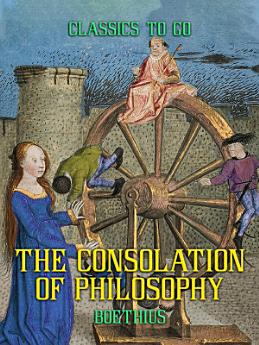The Consolation of Philosophy
May 2022 · Otbebookpublishing
Ebook
118
Pages
family_home
Eligible
info
reportRatings and reviews aren’t verified Learn More
About this ebook
The Consolation of Philosophy is a short work of literature, written in the form of a prosimetrical apocalyptic dialogue (i.e. a dialogue with a mythical, imaginary, or allegorical figure). It contains five Books, which are written in a combination of prose and verse. The dialogue is between Ancius Boethius, a prominent and learned official of the Roman Empire, and the person of Philosophy.
About the author
Anicius Manlius Severinus Boethius, born circa 480 AD, stands as a towering figure in the late Roman and early medieval intellectual landscape. A philosopher, statesman, and theologian, Boethius was born into a prominent Roman family, which allowed him to receive an extensive education in both the classical traditions of Greece and Rome. His intellectual pursuits were vast, spanning logic, theology, and music, making him a polymath of his time.Boethius served as a high-ranking official under the Ostrogothic King Theodoric the Great, a position that placed him at the heart of the political and cultural transformations of the era. However, his career took a dramatic turn when he was accused of treason. The charges, likely politically motivated, led to his imprisonment and eventual execution in 524 AD. This fall from grace and his subsequent martyrdom for his philosophical beliefs have rendered his life story both tragic and compelling.Boethius's works, particularly his translations and commentaries on Aristotle and Plato, played a crucial role in preserving ancient Greek philosophy for the medieval world. His efforts bridged the classical and medieval intellectual traditions, profoundly influencing scholars such as Thomas Aquinas and Dante Alighieri. Boethius's integration of Christian theology with classical philosophy laid the groundwork for the Scholastic movement, making him a pivotal figure in the development of Western thought.His life, marked by intellectual brilliance and political intrigue, continues to captivate modern readers, offering a window into the complexities of a world in transition from antiquity to the Middle Ages.
Rate this ebook
Tell us what you think.
Reading information
Smartphones and tablets
Install the Google Play Books app for Android and iPad/iPhone. It syncs automatically with your account and allows you to read online or offline wherever you are.
Laptops and computers
You can listen to audiobooks purchased on Google Play using your computer's web browser.
eReaders and other devices
To read on e-ink devices like Kobo eReaders, you'll need to download a file and transfer it to your device. Follow the detailed Help Center instructions to transfer the files to supported eReaders.








